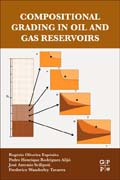
Compositional Grading in Oil and Gas Reservoirs
Oliveira Esposito, Rogerio
Rodrigues Alijo, Pedro Henrique
Scilipoti, Jose Antonio
Wanderley Tavares, Frederico
There are so many challenging compositional reservoirs around the world, yet there is not a unique method to model today's reservoirs because of level of complexity, current available lab data, and the outdated model approaches of commercial simulators. Compositional Grading in Oil and Gas Reservoirs offers instruction, examples and case studies on how to answer the challenges of modeling a compositional gradient subject. Starting with the basics on PVT analysis, applied thermodynamics, and full derivations of irreversible thermodynamic-based equations, this critical reference explains gravity-modified equations to be applied to reservoirs, enabling engineers to obtain fluid composition at any point of the reservoir from measured data to create a stronger model calibration. Once model-parameters are re-estimated, new sensibility can be acquired for more accurate modeling of composition, aiding engineers with stronger production curves, reserve estimations, and design of future development strategies. Multiple examples and case studies are included to show the application of the theory from very simple systems to more complex such as actual reservoirs influenced by thermal diffusion and gravity simultaneously. Other examples include the subsalt layer for which asphaltene precipitation takes place in the reservoir and three -phase flash algorithms for liquid-liquid-vapor equilibrium calculations, detailing the techniques necessary to ensure convergence. Compositional Grading in Oil and Gas Reservoirs combines practical studies with the importance in modeling more complex phenomena, filling a gap for current and upcoming reservoir engineers to expand on solutions and make sense of their reservoir's output results. Understand a deeper level of detail on the heterogeneity composition and thermo-physical properties of petroleum fluids in the reservoirIncrease reliability of your reservoir simulation initialization with practice examples at the end of each chapterMake sense of compositional grading with coverage on both theory and application, fulfilling a gap of research in reservoir simulation INDICE: 1. Reservoir fluids and PVT analysis2. Thermodynamics of Phase Equilibrium3. Phase Equilibrium under the Influence of the Gravitational Field4. Irreversible Thermodynamics Applied to Reservoir Engineering5. Classical Example of the Literature6. Compositional Grading in Brazilian Fields7. The Influence of Molecular Association on Compositional Grading8. Epilogue and New Research
- ISBN: 978-0-12-812452-9
- Editorial: Gulf Professional Publishing
- Encuadernacion: Rústica
- Páginas: 300
- Fecha Publicación: 01/04/2017
- Nº Volúmenes: 1
- Idioma: Inglés
